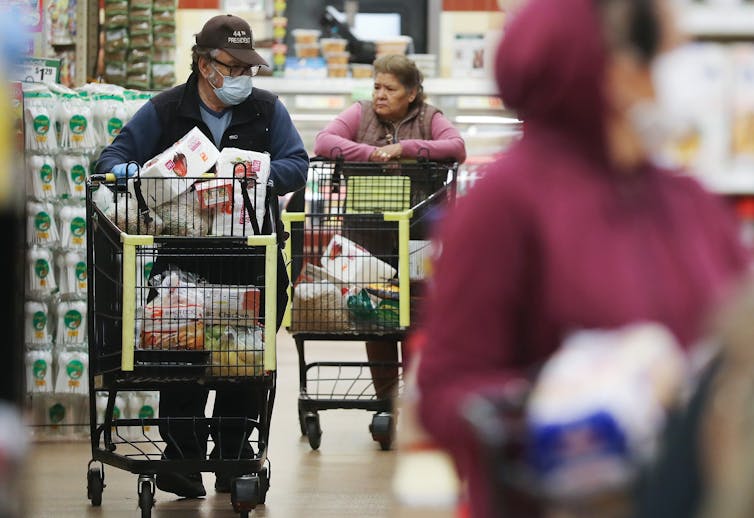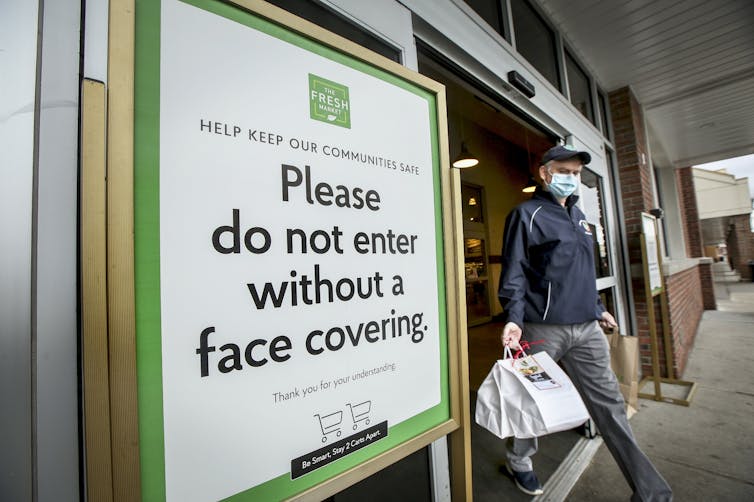Erin DiCaprio, University of California, Davis
 |
| Masks and social distancing can help protect shoppers from the coronavirus, but gloves aren’t recommended. Mario Tama/Getty Images |
As a food virologist, I hear a lot of questions from people about the coronavirus risks in grocery stores and how to stay safe while shopping for food amid the pandemic.
Here are answers to some of the common questions.
Can I touch the tomatoes?
What you touch on the grocery shelves is less of a concern than who breathes on you and other surfaces you might come in contact with in a store. In fact, there is currently no evidence of the virus being transmitted by food or food packaging.
You may have heard about studies showing that the virus can remain infectious for up to 24 hours on cardboard and up to 72 hours on plastic or stainless steel.
These are controlled laboratory studies, in which high levels of infectious virus are applied to the surfaces and humidity and temperature held constant.
In these experiments, the level of infectious virus – virus capable of causing disease – decreased even after a few hours, indicating that the virus does not survive well on these surfaces.
The highest risk is close contact with other people who may be shedding virus in droplets as they sneeze, talk or breathe nearby.
Next would be high-touch surfaces, like door handles, where someone not practicing good hand hygiene might have transferred the virus to the surface. In this scenario, you would have to touch this surface and then touch your own mucus membranes – your eyes, mouth or ears – to contract the illness.
Think about how often a surface is touched, and then decide if you can avoid the riskiest spots or use hand sanitizer after touching them. Significantly more people touch door handles and credit card machines compared to a tomato in a bin.
Do I need to sanitize my food when I get home?
No, you do not need to sanitize your food when you get home, and trying to do so can actually be dangerous.
Chemicals and soaps are not labeled for use use on food. This means we do not know if they are safe or even effective when directly applied to food.
Moreover, some of these practices might create food safety hazards. For example, if you filled a sink with water and then submerged your vegetables in it, pathogenic microorganisms in your sink – say, trapped in the drain from the raw chicken you cut up the night before – might contaminate your produce.
You should instead wash you produce under cool running water and then dry it with a clean towel.
You don’t need to wait to unpack groceries or boxes when you arrive home. Instead, after unpacking, wash your hands.
Washing your hands frequently, using soap and water and drying with a clean towel, is really the best defense for protecting yourself from this virus and many other infectious diseases that might be on a surface or package.
Should I wear gloves in the grocery store?
Gloves are not currently recommended for a visit to the grocery store, in part because they may help spread germs.
If you are wearing gloves, know that disposable gloves are meant for a single use and you should throw them out after you are done shopping.
To take off gloves, grab the band at the wrist on one hand, making sure not to have gloved fingers touch your skin, and pull the glove up over your hand and fingers turning it inside out as you remove.
Best practice is to wash your hands after the gloves are removed. If soap and water is not available, use a hand sanitizer.
How should I deal with other people?
 |
| Wearing a mask helps reduce how far droplets that can carry the coronavirus travel when the wearer talks or sneezes. John Paraskevas/Newsday via Getty Images |
You can have COVID-19 and not know it, so wearing a mask can help keep you from spreading the virus if you’re asymptomatic.
Wearing a mask can also provide some level of protection to the person wearing it, but it does not keep out all droplets and is not 100% effective in preventing disease.
Following social distancing guidelines – keeping 6 feet between you and the next person – is very important when you are in a store or any other space with other people.
If you’re over 65 or have a compromised immune system, see if the grocery has special hours for high-risk populations, and consider having groceries delivered to your home instead.
Can I still bring my own bags?
Many grocery stores have stopped allowing the use of reusable bags because of the potential risks to their workers.
If you are using a reusable nylon or plastic bag, clean inside and outside of the bag with soapy water and rinse. Spray or wipe down the bag inside and out with diluted bleach solution or disinfectant, then allow the bag to air dry completely. For cloth bags, wash the bag in warm water with normal laundry detergent, then dry it on the warmest setting possible.
Everyone has to be more aware of their surroundings to stay safe during this pandemic. Remember to wear your mask and keep your distance from others and you can minimize the risks.
[You need to understand the coronavirus pandemic, and we can help. Read The Conversation’s newsletter.]
Erin DiCaprio, Assistant Specialist in Cooperative Extension and Food Virology Researcher, University of California, Davis
This article is republished from The Conversation under a Creative Commons license. Read the original article.